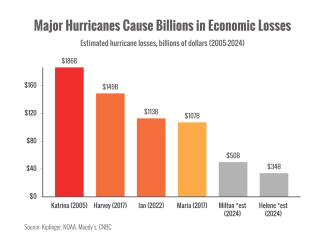
Hurricane Impact
It’s been a rough couple of weeks for the Southeast.
Storms can take a massive toll on families and communities, with challenges that take months and years to resolve.
With an active hurricane season upon us, I'd like to take a moment to talk about how natural disasters can affect markets and the economy.
Natural disasters typically impact the economy in a few ways:
- Regional, national, and even international supply chains can be disrupted as roads and ports close and goods struggle to move from place to place
- Economic growth can slow down as businesses shut down, jobs are lost, and consumer demand slows down
- Markets often experience short-term volatility as investors react to the news and rush to buy and sell
- Energy prices may spike due to scarcity and supply disruptions
While some companies (such as insurers) typically take a hit from anticipated disaster losses, other businesses (like generator manufacturers) may see a spike due to expected demand.1
This chart shows the financial cost of some hurricanes in the last two decades.
While natural disasters may have a severe short-term impact on local and regional economies, research suggests the long-term negative effects are limited.2
One note to consider: estimates of Helene and Milton damage may be low as it may take years to account for the full cost of property damage, business closures, and economic disruption.
Let's also keep in mind that billions of dollars in financial losses are massive, but they’re still a drop in the bucket of the overall economy, which is over $27 trillion in size.3
Of course, the plain numbers don't tell the full story of lives lost and lives disrupted.
Hard-hit areas may take a long time to recover, and some places may never fully return to normal.
In the weeks and months to come, we may see an impact from the hurricanes on inflation, unemployment, and growth data.
Storms are just one factor we're watching this fall.
Markets are also grappling with rising tensions in the Middle East as well as the politics of the upcoming election.
We're also monitoring inflation and labor market data for hints as to when the Federal Reserve might cut rates again.
Have questions or concerns? Please don't hesitate to reach out.
Be well, be safe, and hug your loved ones extra tight.
Sources:
1. https://www.cnbc.com/2024/10/07/generator-maker-generac-soars-insurance-stocks-fall-on-hurricane-milton.html
2. https://www.frbsf.org/wp-content/uploads/wp2020-34.pdf
3. https://data.worldbank.org/indicator/NY.GDP.MKTP.CD?end=2023&locations=US&start=1960&view=chart
Chart sources: https://www.investors.com/news/hurricane-helene-34-billion-price-tag-stock-market-impact/
https://www.cnbc.com/2024/10/08/hurricane-milton-could-cause-as-much-as-175-billion-in-damages-according-to-early-estimates.html
https://www.kiplinger.com/slideshow/business/t019-s001-most-expensive-natural-disasters-in-u-s-history/index.html
Risk Disclosure: Investing involves risk including the potential loss of principal. No investment strategy can guarantee a profit or protect against loss in periods of declining values. Past performance does not guarantee future results.
This material is for information purposes only and is not intended as an offer or solicitation with respect to the purchase or sale of any security. The content is developed from sources believed to be providing accurate information; no warranty, expressed or implied, is made regarding accuracy, adequacy, completeness, legality, reliability, or usefulness of any information. Consult your financial professional before making any investment decision. For illustrative use only.
The S&P 500 is an unmanaged composite index considered to be representative of the U.S. stock market in general. Past performance is no guarantee of future results. Indices are unmanaged, do not incur fees, costs, and expenses, and cannot be invested into directly. For illustrative purposes only. Past performance is no guarantee of future results.

